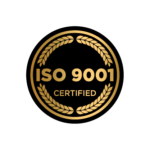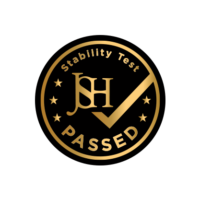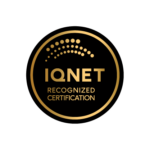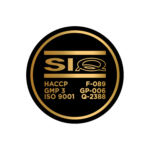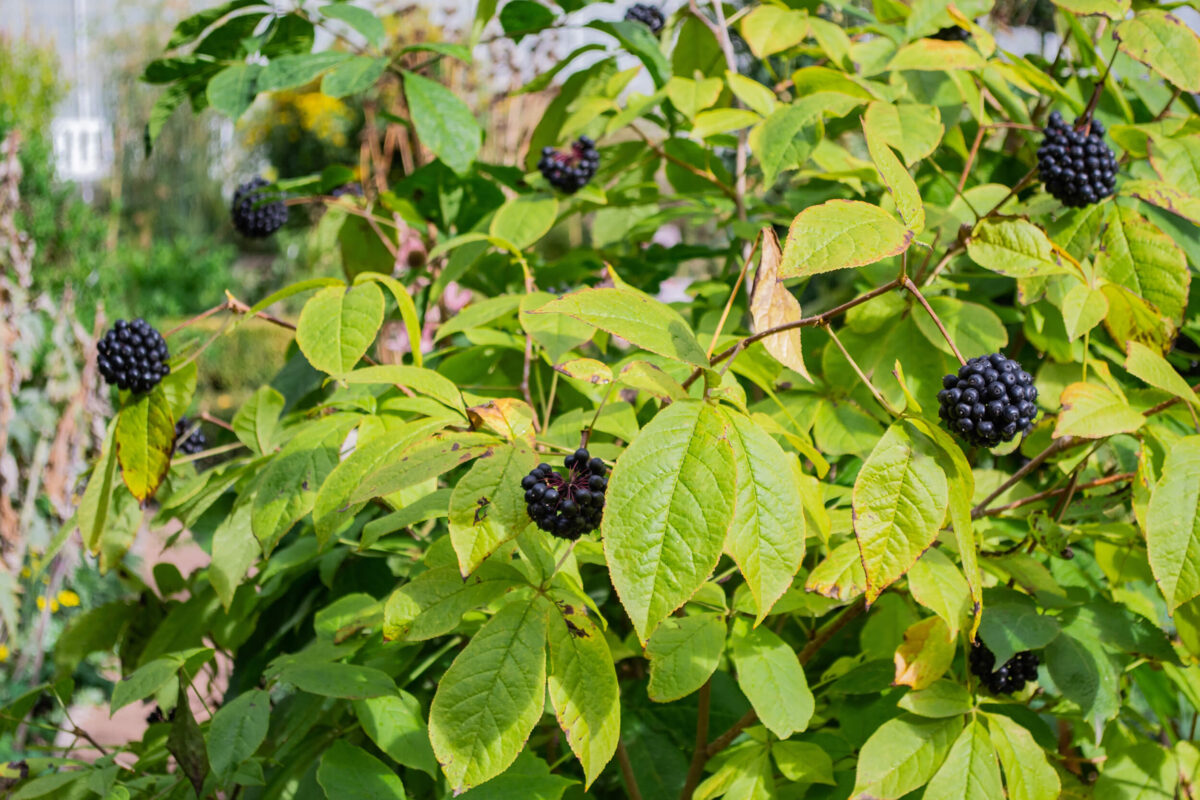
What if I told you that one of the most powerful brain boosters on Earth has been hiding behind the wrong name for over 70 years?
Here’s something that might surprise you: Siberian ginseng isn’t ginseng at all. It’s not even related to real ginseng. Yet this “fake” ginseng might be doing more for your brain than the real thing ever could.
I stumbled across this fascinating truth while researching ingredients for our latest cognitive formula. What started as routine ingredient research turned into a deep dive into one of nature’s most misunderstood plants—and what I discovered changed everything I thought I knew about natural brain enhancement.
You see, while everyone’s been chasing the latest synthetic nootropics and fancy lab-created compounds, this Arctic plant has been quietly outperforming them all. Soviet scientists knew this secret decades ago. Olympic athletes have been using it for years. And now, finally, the rest of us are catching on.
But here’s what really matters for you: this isn’t just another “superfood” story. This is about a plant that can genuinely change how your brain handles stress, maintains focus, and protects itself over time. And unlike so many other natural remedies that sound great in theory but fall flat in practice, this one actually delivers.
The story of how it got its misleading name is fascinating. The science behind why it works is even better. And by the time you finish reading this, you’ll understand exactly why we made it a cornerstone ingredient in our 17-component Genius formula—right alongside our premium shilajit base.
Ready to meet the plant that’s been fooling everyone with its name but impressing everyone with its results?
The fascinating story of Siberian ginseng begins in the mid-20th century with Soviet scientific research. In 1943, the USSR launched a research program to identify plant substances that could improve stamina and resilience, particularly for defense personnel during World War II. Professor I.I. Brekhman published the first scientific article about Eleutherococcus senticosus in 1958, and the plant was officially established as a medicinal plant in the USSR pharmacopoeia in 1962.
But here’s where the identity confusion comes in: this plant isn’t actually ginseng at all.
Eleutherococcus senticosus is a species of small, woody shrub in the family Araliaceae, while true ginseng—American ginseng (Panax quinquefolius) and Asian ginseng (Panax ginseng)—are different plants entirely. As of 2002, it is prohibited in the U.S. to use the term “ginseng” for any plant that doesn’t contain ginsenosides—the compounds found in true ginseng.
The medicinal uses of Eleuthero were largely unknown until Panax ginseng, due to overharvesting, became difficult to obtain. Russian scientists then began screening other plants in the Araliaceae family for related compounds. Eleuthero was found to have similar therapeutic effects and became a substitute for the newly scarce Panax.
The name “Siberian ginseng” stuck, even though the term has never actually been used in the USSR/Russia, and Eleutherococcus senticosus is not even native to Siberia. The plant originates from far eastern regions of Russia, northern areas of Korea, Japan and China, growing naturally in the undergrowth of coniferous and mixed forests.
The term “adaptogen” was coined by pharmacologist Dr. Nikolai Lazarev in 1947, specifically in reference to Eleuthero’s ability to enhance resistance to environmental stress. This was a completely different approach from traditional stimulants—instead of just giving you energy, adaptogens were supposed to help your body adapt to whatever stress came its way.
This difference between being a stimulant and being an adaptogen would prove crucial for understanding how this plant affects your brain.
Before we dive into the research, let’s get acquainted with this remarkable plant itself. Eleutherococcus senticosus is quite different from what most people imagine when they hear “ginseng.”
Picture a thorny, deciduous shrub that can grow up to 6 feet tall, with multiple stems rising from a branched root system. The name actually gives you clues about its appearance: “Eleutherococcus” comes from Greek meaning “free-berried,” while “senticosus” is Latin for “thorny” or “full of briers.” This isn’t a delicate plant—it’s built for survival.
You’ll find it growing wild in the undergrowth of coniferous and mixed forests across northeastern Asia. It thrives in the cold to moderate climates of far eastern Russia, northern China, Korea, and Japan, typically on mountain slopes between 600-800 meters above sea level. The plant is remarkably hardy, tolerating everything from sandy to heavy clay soils, whether acidic, neutral, or alkaline.
The leaves grow in clusters of 3-5 leaflets (usually 5), each one elliptical and serrated around the edges. In July, it produces small, inconspicuous flowers that develop into dark purple berries. But it’s the root system that contains the medicinal treasure—cylindrical roots up to half a centimeter in diameter with dark brown bark that clings tightly to the inner wood.
What’s fascinating is how this tough, spiny shrub reflects the very qualities it imparts: resilience, adaptability, and the ability to thrive in challenging conditions. The plant literally embodies the concept of an adaptogen—it has learned to survive and flourish in harsh environments, and somehow it passes that wisdom along to us.
The roots are harvested typically in autumn when the plant’s energy has concentrated back into its underground system. Those gnarled, brown roots might not look like much, but they contain over a dozen different eleutherosides—the active compounds that have captured scientists’ attention for decades.
Now, let’s explore what that research has actually discovered.
To understand why Siberian ginseng works so differently from caffeine or other stimulants, you need to know about your stress response system. Think of it as your body’s internal alarm system.
When you’re under pressure—whether it’s a work deadline, lack of sleep, or just daily life stress—your brain activates what scientists call the hypothalamic-pituitary-adrenal (HPA) axis. This system floods your body with stress hormones like cortisol, which can be helpful in short bursts but damaging when constantly activated.
Here’s where adaptogens like Siberian ginseng work differently than stimulants. Instead of forcing your system to work harder (like caffeine does), adaptogens help regulate your stress response itself. It’s the difference between pushing a car with a broken engine versus actually fixing the engine.
Siberian ginseng contains compounds called eleutherosides—specifically eleutherosides A through M—which are chemically distinct glycosides that appear to work on multiple systems in your brain and body simultaneously.
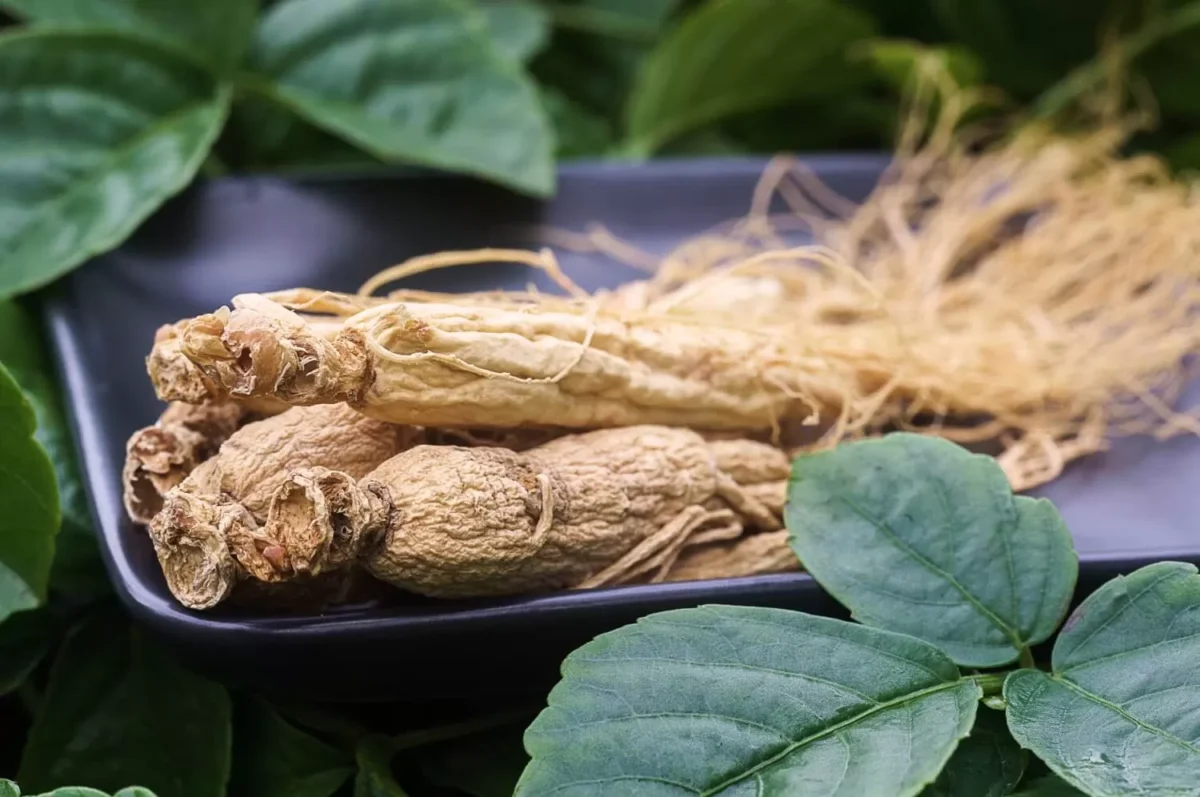
The three main ways it supports your brain function:
Mental Fatigue Reduction: When you’re mentally exhausted, it’s often because your stress response system is overworked. Siberian ginseng helps modulate cortisol production, which can prevent that “brain fog” feeling that comes from chronic stress. You maintain clearer thinking even when you’re under pressure.
Enhanced Focus Under Stress: Unlike stimulants that can make you jittery when stressed, Siberian ginseng actually seems to improve cognitive performance specifically during stressful situations. It’s like having a steady hand during turbulence rather than white-knuckling through it.
Long-term Cognitive Protection: Perhaps most importantly, by helping regulate your stress response, Siberian ginseng may protect your brain from the long-term damage that chronic stress can cause. Elevated cortisol over time can actually shrink certain brain regions involved in memory and learning.
When you’ll notice the difference:
You won’t feel a sudden rush like you would with caffeine. Instead, you might notice that you stay mentally sharp during your usual afternoon energy dip, or that you handle stressful meetings with more calm focus. Many people report feeling more resilient—like daily stresses just don’t hit as hard.
The effects tend to build over time rather than appearing immediately, which is typical for adaptogenic compounds. Your body is literally adapting to handle stress more efficiently.
The research on Siberian ginseng’s brain benefits tells a fascinating story—one where the preclinical evidence is remarkably strong, but human studies are still catching up. Here’s what decades of scientific investigation have revealed.
The secret lies in specific compounds called eleutherosides, particularly eleutherosides B and E. Think of these as the plant’s specialized molecules that can cross your blood-brain barrier and get to work where you need them most. Unlike the ginsenosides found in true ginseng, these eleutherosides work through entirely different pathways.
Research by Yamauchi et al. (2019) confirmed that these compounds actually make it into brain tissue after oral consumption—something many plant compounds fail to do. This bioavailability is crucial because it means the benefits you see in lab studies can potentially translate to real-world effects.
Multiple animal studies consistently show the same pattern: when researchers give Siberian ginseng or isolated eleutherosides to lab animals, their memory and learning improve significantly. But here’s what makes this research compelling—it’s not just that the animals get “smarter.” The studies show specific, measurable changes in brain chemistry.
Enhanced Cholinergic Function: A landmark study by Huang et al. (2013) demonstrated that eleutherosides B and E boost acetylcholine levels and increase choline acetyltransferase—essentially giving your brain more of the neurotransmitter crucial for memory formation and recall.
Reduced Neuroinflammation: Chronic inflammation in the brain is like having a constant low-grade fever that impairs cognitive function. Research by Cui et al. (2025) showed that Siberian ginseng saponins significantly lowered key inflammatory markers while boosting antioxidant activity in Alzheimer’s disease models.
Activated Survival Pathways: Perhaps most importantly, studies by Lu & Chai (2019) found that the compounds activate cellular pathways (BDNF, MAPK, CREB, PI3K-Akt) that help brain cells survive stress and form new connections. It’s like giving your neurons better tools for repair and adaptation.
Some of the most impressive research involves studying how Siberian ginseng protects against brain damage. In studies where animals were exposed to radiation, anesthesia-induced cognitive dysfunction, or Alzheimer’s-type changes, those given Siberian ginseng consistently maintained better cognitive function.
Zhang et al. (2024) used a model of Alzheimer’s disease and found that mice given Siberian ginseng extract showed improved object recognition memory alongside activation of protective MAPK signaling pathways. Meanwhile, research by Song et al. (2022) demonstrated that eleutheroside E and syringin could prevent cognitive deficits in radiation-exposed mice through neurotransmitter modulation.
Here’s where we need to be honest about the current state of research. While the animal studies are compelling, human research is still limited.
The few human studies that exist show modest but measurable effects. Arushanian et al. (2003) found that in healthy adults, single doses of Siberian ginseng extract improved short-term memory and visual sensitivity, though effects varied based on timing and individual differences. Tohda et al. (2020) conducted a 12-week study combining Siberian ginseng with another herb and showed improvements in figure recall and language function, but we can’t isolate Siberian ginseng’s contribution.
Importantly, research by Facchinetti et al. (2002) found that Siberian ginseng can reduce the physiological stress response to cognitive challenges—lowering heart rate and blood pressure during mental stress tests. While this doesn’t directly measure cognitive improvement, it suggests the adaptogenic effects extend to how your brain handles pressure.
The main challenge isn’t that the plant doesn’t work—it’s that most human studies haven’t used standardized extracts with known eleutheroside content. Without consistent dosing and quality control, it’s hard to replicate the precise conditions that showed benefits in laboratory settings.
Additionally, many human studies use combination formulas rather than isolated Siberian ginseng, making it impossible to determine which effects come from which plant.
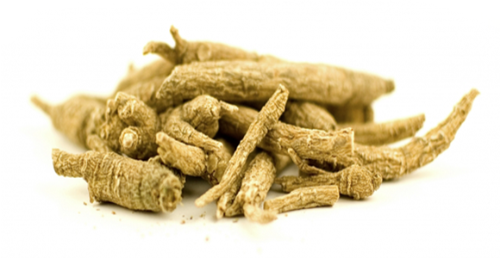
The scientific foundation is solid: Siberian ginseng contains bioactive compounds that can enhance memory, protect against cognitive decline, and support brain resilience through multiple well-documented mechanisms. The animal research is remarkably consistent across different models and research groups.
For human applications, we’re in that transitional phase where the mechanistic understanding and preclinical evidence strongly support cognitive benefits, but large-scale clinical trials are still needed to establish optimal dosing and long-term effects in diverse populations.
When we created Genius, we weren’t looking to throw together trendy nootropics. We wanted real science, traditional wisdom, and synergistic potential. Siberian ginseng earned its place through rigorous selection.
While our premium shilajit base provides mitochondrial support, Siberian ginseng handles the stress response system. This matters because chronic stress sabotages cognitive performance. The adaptogenic properties help modulate cortisol levels, allowing other cognitive enhancers in the formula to work more effectively.
We use a standardized extract guaranteeing specific levels of eleutherosides B and E—the compounds that showed the strongest effects in research. This means consistent, research-backed potency in every dose, not the hit-or-miss experience of unstandardized extracts.
Combined with our other 15 carefully selected ingredients, Siberian ginseng creates the optimal internal environment for comprehensive cognitive enhancement.
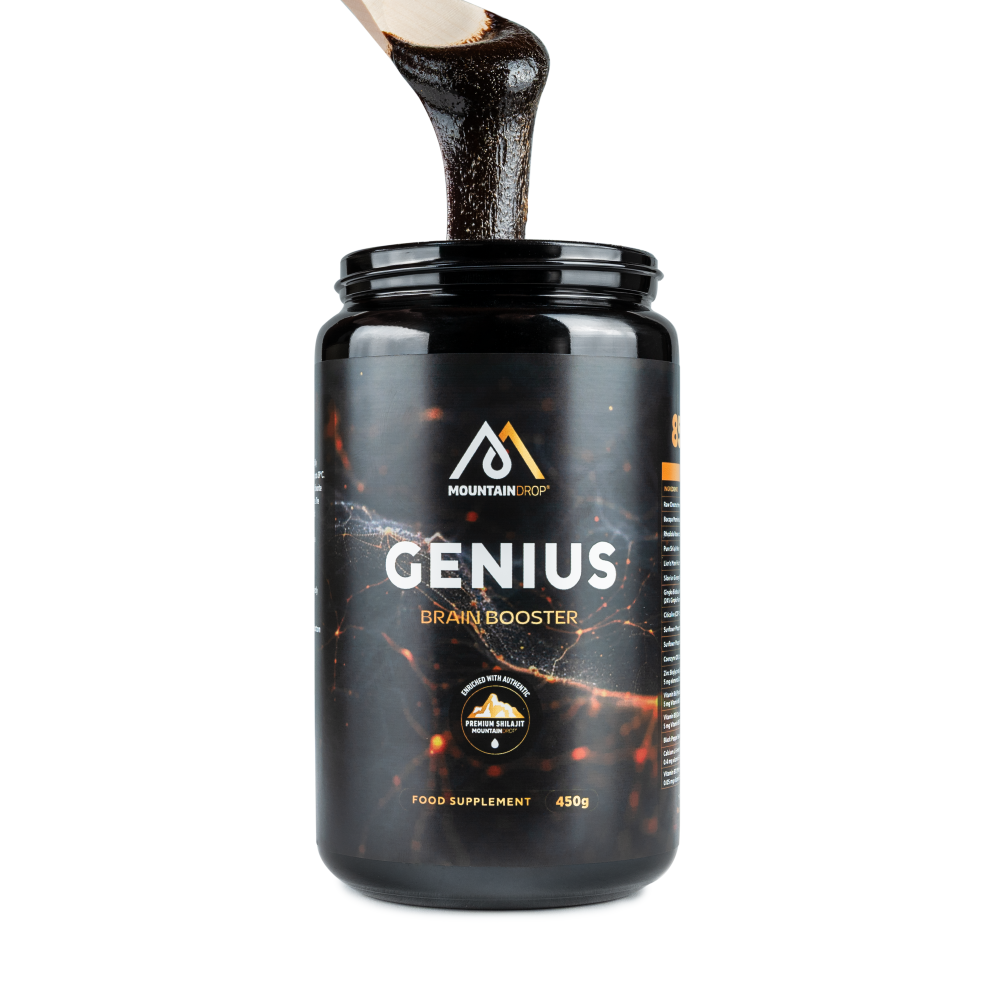
Siberian ginseng represents everything we believe about effective cognitive enhancement: solid science, traditional wisdom, and real-world results. It’s not about quick fixes or dramatic transformations—it’s about building genuine cognitive resilience that serves you over the long term.
The research is clear: this adaptogenic plant can enhance memory, protect against cognitive decline, and help your brain perform better under pressure. When combined with the other research-backed ingredients in Genius, it contributes to a comprehensive approach to cognitive optimization that goes beyond what any single ingredient could achieve alone.
Your brain deserves better than random supplements with flashy marketing. It deserves the kind of thoughtful, science-based support that comes from understanding how these compounds actually work—and how they work together.
That’s the Genius difference.

Copyright 2024 © Mountaindrop. All rights reserved. Powered by EOSNET

